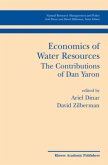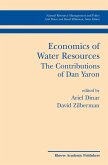Centralized, top-down management of water resources through regulations has created unnecessary economic burdens upon users. More flexible decentralized controls through the use of economic incentives have gained acceptance over the past decade. The theme of this book is the increasing efforts throughout water-scarce regions to rely upon economic incentives and decentralized mechanisms for efficient water management and allocation.
The book begins with a section of introductory chapters describing water systems, institutions, constraints, and similarities in the following regions: Israel and the Middle East, Turkey, California, Florida, and Australia. Four of these regions face similar climates with wet winters and dry summers. Florida has a more even seasonal distribution of rainfall, yet it uses similar management strategies in controlling groundwater demand and water quality.
The book concludes with a section on water management case studies. These case studies examine issues of conflict related to both water quality and water quantity. While the case studies address both international and intranational concerns in specific regions of the world, they portray broad principles that are applicable to many regions.
The book begins with a section of introductory chapters describing water systems, institutions, constraints, and similarities in the following regions: Israel and the Middle East, Turkey, California, Florida, and Australia. Four of these regions face similar climates with wet winters and dry summers. Florida has a more even seasonal distribution of rainfall, yet it uses similar management strategies in controlling groundwater demand and water quality.
The book concludes with a section on water management case studies. These case studies examine issues of conflict related to both water quality and water quantity. While the case studies address both international and intranational concerns in specific regions of the world, they portray broad principles that are applicable to many regions.








